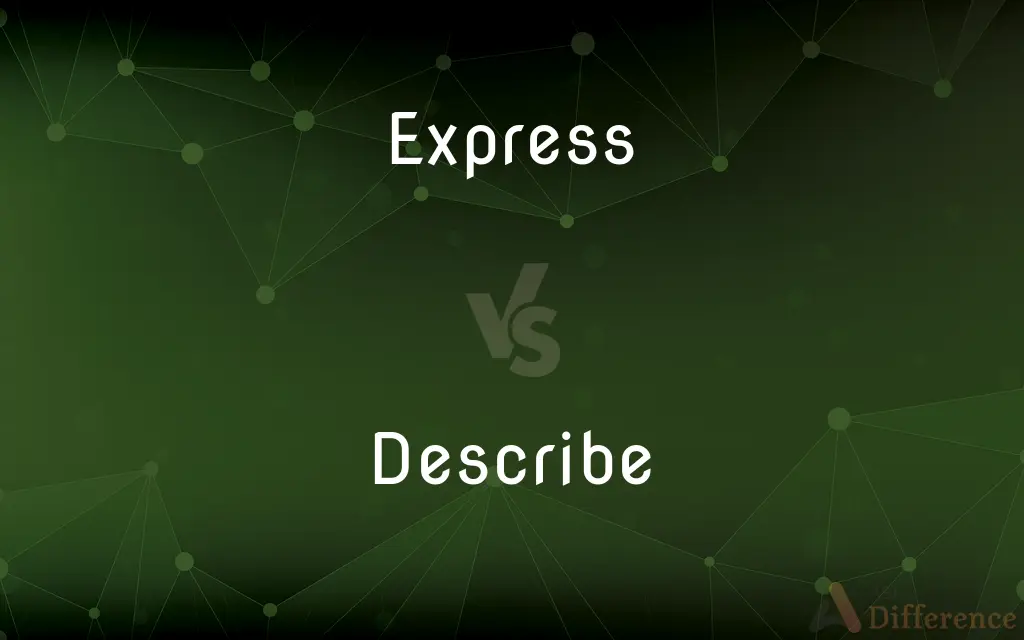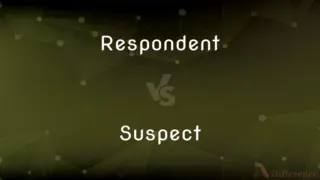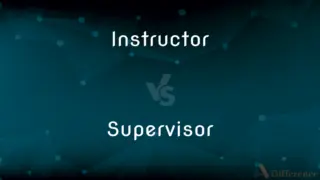Express vs. Describe — What's the Difference?
By Fiza Rafique & Urooj Arif — Updated on April 16, 2024
"Express" involves conveying thoughts or feelings clearly and directly, often in speech or writing, whereas "describe" entails providing detailed information about something to create a vivid image or understanding.

Difference Between Express and Describe
Table of Contents
ADVERTISEMENT
Key Differences
"Express" is primarily about communication, emphasizing the clarity and immediacy of sharing one's thoughts or emotions. In contrast, "describe" focuses more on detail and depth, aiming to paint a comprehensive picture of a subject through words.
Expressing can be done through various forms such as speech, gestures, or art, making it a versatile means of communication. On the other hand, describing typically involves using detailed narrative or explanatory language, often requiring more elaboration.
In everyday use, to express can mean to reveal one's feelings or opinions, often without needing elaborate details. Whereas to describe something involves delving into characteristics, features, and aspects in a way that others can visualize or understand clearly.
Expressions can be quick and to the point, designed to convey immediate feelings or reactions. Conversely, descriptions might take longer because they aim to provide a fuller, more nuanced understanding of the subject.
When someone expresses an idea, they are putting it out there for others to react or respond to, focusing on the act of communication itself. In contrast, when someone describes an idea, they are more concerned with ensuring the listener or reader fully grasits the concept or scene.
ADVERTISEMENT
Comparison Chart
Purpose
To convey feelings or ideas
To detail characteristics
Communication
Direct and immediate
Detailed and elaborate
Usage
Quick sharing of emotions
In-depth explanation
Common Forms
Speech, gestures, art
Narrative, descriptive text
Outcome
Immediate understanding
Comprehensive understanding
Compare with Definitions
Express
To convey feelings or opinions openly.
She expressed her disappointment clearly.
Describe
To give an account or representation of in words.
The witness described the scene in detail.
Express
To squeeze out or press out a substance.
Freshly expressed orange juice is the best.
Describe
To trace or outline a shape.
The child described a circle in the air with his finger.
Express
To represent an idea in a particular form.
The artist expresses modern anxieties through his sculptures.
Describe
To depict in art or literature.
The novel describes the adventures of a young sailor.
Express
To send goods or messages swiftly.
He decided to express the package to ensure it arrived on time.
Describe
To specify characteristics or details.
The brochure describes each model's features.
Express
To denote or signify.
A raised eyebrow can express skepticism without words.
Describe
To classify or categorize something specifically.
Scientists describe new species based on distinct traits.
Express
To set forth in words; state
Express an opinion.
Describe
To give an account of in speech or writing
Describe a sea voyage.
Express
To manifest or communicate, as by a gesture; show
Expressed his anger with a frown.
Describe
To convey an idea or impression of; characterize
She described her childhood as a time of wonder and discovery.
Express
To make known the feelings or opinions of (oneself), as by statement or art.
Describe
To represent pictorially; depict
Goya's etchings describe the horrors of war in grotesque detail.
Express
To convey or suggest a representation of; depict
The painting expresses the rage of war victims.
Describe
To trace the form or outline of
Describe a circle with a compass.
Express
To represent by a sign, symbol, number, or formula
Express a fraction as a decimal.
Describe
(transitive) To represent in words.
The feeling is difficult to describe, but not unpleasant.
The geographer describes countries and cities.
Several witnesses describe seeing lights in the sky that night.
Express
To squeeze or press out, as juice from an orange.
Describe
(transitive) To represent by drawing; to draw a plan of; to delineate; to trace or mark out.
To describe a circle by the compasses;
A torch waved about the head in such a way as to describe a circle
Express
To send by special messenger or rapid transport
Express a package to Los Angeles.
Describe
To give rise to a geometrical structure.
The function describes a very complex surface.
Express
To synthesize (a product, especially a protein) encoded by a gene
A gene that expresses an enzyme.
Describe
To introduce a new taxon to science by explaining its characteristics and particularly how it differs from other taxa.
The fungus was first described by a botanist.
Express
To manifest the effects of (a gene)
Half of the people who inherit the gene express it.
Describe
(obsolete) To distribute into parts, groups, or classes; to mark off; to class.
Express
To manifest (a genetic trait)
All the mice in the study expressed the defect.
Describe
To represent by drawing; to draw a plan of; to delineate; to trace or mark out; as, to describe a circle by the compasses; a torch waved about the head in such a way as to describe a circle.
Express
Definitely and explicitly stated
Their express wish.
Describe
To represent by words written or spoken; to give an account of; to make known to others by words or signs; as, the geographer describes countries and cities.
Express
Particular; specific
An express plan.
Describe
To distribute into parts, groups, or classes; to mark off; to class.
Passed through the land, and described it by cities into seven parts in a book.
Express
Rapid and having few or no stops or interruptions
Express delivery of packages.
An express bus.
Describe
To use the faculty of describing; to give a description; as, Milton describes with uncommon force and beauty.
Express
Of, relating to, or appropriate for rapid travel
Express lanes on a freeway.
Describe
Give a description of;
He drew an elaborate plan of attack
Express
Designed for use in an express rifle
An express bullet.
Describe
To give an account or representation of in words;
Discreet Italian police described it in a manner typically continental
Express
By express delivery or transport.
Describe
Identify as in botany or biology, for example
Express
A rapid, efficient system for the delivery of goods and mail.
Describe
Make a mark or lines on a surface;
Draw a line
Trace the outline of a figure in the sand
Express
Goods and mail conveyed by such a system.
Express
A means of transport, such as a train, that travels rapidly and makes few or no stops before its destination.
Express
A special messenger.
Express
A message delivered by special courier.
Express
(not comparable) Moving or operating quickly, as a train not making local stops.
Express
(comparable) Specific or precise; directly and distinctly stated; not merely implied.
I gave him express instructions not to begin until I arrived, but he ignored me.
This book cannot be copied without the express permission of the publisher.
Express
Truly depicted; exactly resembling.
In my eyes it bore a livelier image of the spirit, it seemed more express and single, than the imperfect and divided countenance.
Express
Providing a more limited but presumably faster service than a full or complete dealer of the same kind or type.
Pizza Hut Express
McDonald's Express
Express
A mode of transportation, often a train, that travels quickly or directly.
I took the express into town.
Express
A service that allows mail or money to be sent rapidly from one destination to another.
Express
An express rifle.
Express
(obsolete) A clear image or representation; an expression; a plain declaration.
Express
A messenger sent on a special errand; a courier.
Express
An express office.
Express
That which is sent by an express messenger or message.
Express
(obsolete) The action of conveying some idea using words or actions; communication, expression.
Express
(obsolete) A specific statement or instruction.
Express
Moving or operating quickly, as a train not making local stops.
The train runs express to 96 St.
Express
(transitive) To convey or communicate; to make known or explicit.
Words cannot express the love I feel for him.
Express
(transitive) To press, squeeze out (especially said of milk).
Express
(biochemistry) To translate messenger RNA into protein.
Express
(biochemistry) To transcribe deoxyribonucleic acid into messenger RNA.
Express
Exactly representing; exact.
Their human countenanceThe express resemblance of the gods.
Express
Directly and distinctly stated; declared in terms; not implied or left to inference; made unambiguous by intention and care; clear; not dubious; as, express consent; an express statement.
I have express commandment.
Express
Of or pertaining to an express train or other conveyance designated an express{5}; makiung few or no intermediate stops; as, an express stop; an express fare; an express elevator.
Express
Intended for a particular purpose; relating to an express; sent on a particular errand; dispatched with special speed; as, an express messenger or train. Also used adverbially.
A messenger sent express from the other world.
Express
A clear image or representation; an expression; a plain declaration.
The only remanent express of Christ's sacrifice on earth.
Express
A messenger sent on a special errand; a courier; hence, a regular and fast conveyance; commonly, a company or system for the prompt and safe transportation of merchandise or parcels.
Express
An express office.
She charged him . . . to ask at the express if anything came up from town.
Express
That which is sent by an express messenger or message.
Express
A railway train or bus for transporting passengers or goods with speed and punctuality; a train or bus that does not stop at certain stations. Contrasted to local; as, take the express to get there faster.
Express
To press or squeeze out; as, to express the juice of grapes, or of apples; hence, to extort; to elicit.
All the fruits out of which drink is expressed.
And th'idle breath all utterly expressed.
Halters and racks can not express from theeMore than by deeds.
Express
To make or offer a representation of; to show by a copy or likeness; to represent; to resemble.
Each skillful artist shall express thy form.
So kids and whelps their sires and dams express.
Express
To give a true impression of; to represent and make known; to manifest plainly; to show in general; to exhibit, as an opinion or feeling, by a look, gesture, and esp. by language; to declare; to utter; to tell.
My words express my purpose.
They expressed in their lives those excellent doctrines of morality.
Express
To make known the opinions or feelings of; to declare what is in the mind of; to show (one's self); to cause to appear; - used reflexively.
Mr. Phillips did express with much indignation against me, one evening.
Express
To denote; to designate.
Moses and Aaron took these men, which are expressed by their names.
Express
To send by express messenger; to forward by special opportunity, or through the medium of an express; as, to express a package.
Express
To produce products that cause the appearance of the corresponding phenotype; - of a gene or of an organism with a specific gene; as, to express the beta-galactosidase gene,
Express
Rapid transport of goods
Express
Mail that is distributed by a rapid and efficient system
Express
Public transport consisting of a fast train or bus that makes a limited number of scheduled stops;
He caught the express to New York
Express
Give expression to;
She showed her disappointment
Express
Articulate; either verbally or with a cry, shout, or noise;
She expressed her anger
He uttered a curse
Express
Indicate through a symbol, formula, etc.;
Can you express this distance in kilometers?
Express
Serve as a means for expressing something;
The painting of Mary carries motherly love
His voice carried a lot af anger
Express
Manifest the effects of (a gene or genetic trait);
Many of the laboratory animals express the trait
Express
Obtain from a substance, as by mechanical action;
Italians express coffee rather than filter it
Express
Send my rapid transport or special messenger service;
She expressed the letter to Florida
Express
Not tacit or implied;
Her express wish
Express
Without unnecessary stops;
An express train
An express shipment
Express
By express;
Please send the letter express
Common Curiosities
What role does describing play in storytelling?
Describing sets the scene, builds character depth, and enhances the narrative, helping readers immerse themselves in the story.
How does one improve their descriptive writing?
By expanding vocabulary, practicing sensory details, and reading extensively to see how other writers effectively use description.
Can descriptions be subjective?
Yes, descriptions can be subjective as they often reflect the describer's perspective, especially in terms of detail and emphasis.
Are there any professions particularly focused on expression?
Yes, professions like acting, writing, and therapy focus heavily on expression as a fundamental aspect of their work.
What is typically involved in expressing an emotion?
It involves conveying feelings through words, facial expressions, body language, or actions to communicate emotional states.
Can one express without speaking?
Yes, one can express thoughts or emotions through non-verbal means such as art, sign language, or facial expressions.
What are common tools used for expressing opinions in writing?
Rhetorical devices, persuasive language, and structured arguments are common tools used to express opinions clearly in writing.
What's the difference between describing and narrating?
Describing involves detailing various aspects of a subject, while narrating involves telling a story or recounting events in sequence.
What are some common mistakes in expressing emotions?
Common mistakes include using vague language, not matching facial expressions or body language with words, and over or under-expressing emotions.
Is it necessary to use complex language to express an idea?
No, expressing an idea effectively can be achieved using simple and clear language to ensure the message is easily understood.
Can descriptions be too detailed?
Yes, overly detailed descriptions can overwhelm the reader or listener, potentially obscuring the main points or narrative flow.
How can descriptions affect reader perception in journalism?
Descriptions can significantly influence how readers perceive events or individuals, potentially shaping public opinion.
What is the importance of expressing gratitude?
Expressing gratitude can strengthen relationships, improve mental health, and create a positive social environment.
What impact does effective description have on academic writing?
Effective description can provide clarity, support arguments, and help convey complex ideas more comprehensibly in academic writing.
Share Your Discovery

Previous Comparison
Respondent vs. Suspect
Next Comparison
Instructor vs. SupervisorAuthor Spotlight
Written by
Fiza RafiqueFiza Rafique is a skilled content writer at AskDifference.com, where she meticulously refines and enhances written pieces. Drawing from her vast editorial expertise, Fiza ensures clarity, accuracy, and precision in every article. Passionate about language, she continually seeks to elevate the quality of content for readers worldwide.
Co-written by
Urooj ArifUrooj is a skilled content writer at Ask Difference, known for her exceptional ability to simplify complex topics into engaging and informative content. With a passion for research and a flair for clear, concise writing, she consistently delivers articles that resonate with our diverse audience.














































